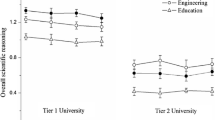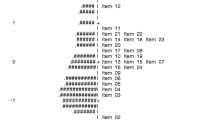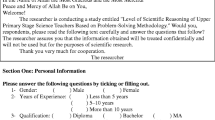Abstract
An ultimate goal of higher education is to prepare our future workers with needed knowledge and skills. This includes cultivating students to become proficient reasoners who can utilize proper scientific reasoning to devise causal inferences from observations. Conventionally, students with more years of higher education are expected to have a greater level of scientific reasoning. Also expected traditionally is that studying science and engineering or attending top-rated universities can better promote students’ scientific reasoning than studying other majors or attending lower ranked institutions. In this study, we used Lawson’s Classroom Test of Scientific Reasoning (LCTSR) with 1,637 Chinese students in different years of study, different fields, and different university tiers. It was found that regardless of which major or university students entered, their scientific reasoning measured by the LCTSR showed little variation across the entire 4 years of undergraduate education. Simply put, there was little association between tertiary-level learning and scientific reasoning. This study calls our attention to the status quo of higher education and motivates researchers across the globe to look into this issue in their own nations.




Similar content being viewed by others
Notes
It is worth noting that the framing of scientific reasoning in the present study is anchored in the theoretical basis of evidence-based hypothesis generation and evaluation—a framework grounded in the relevant literature (see, for example, Braaten & Windschitl, 2011; D. Kuhn & Dean, 2004; Lawson, 2004; Lawson et al., 2000; Zimmerman, 2000). It is true that scientific reasoning may involve pure mathematic-logical processes, which without considering any science content will only yield either true or false outcomes. However, scientific statements in essence are human-constructed descriptions or explanations about the natural world (Kuhn & Hacking, 2012; Popper, 2002). They are tentative, subject to change, and cannot be oversimplified into dichotomies of absolutely true or false (Akerson, Abd-El-Khalick & Lederman, 2000; Lederman, 2007). In this study, we follow the aforementioned literature on scientific reasoning and focus on key skills needed for constructing evidence-based causal inferences.
Scientific reasoning and content knowledge are often intertwined, forming a mutually corroborative relation (see, for example, Coletta & Phillips, 2005; Nieminen et al., 2012; Schauble, 1996; Schunn & Anderson, 1999; Zimmerman, 2007). The philosophical debate on whether acquisition of content knowledge should precede formation of reasoning (or vice versa) is beyond the scope of the study.
References
Akerson, V., Abd-El-Khalick, F. & Lederman, N. (2000). Influence of a reflective explicit activity-based approach on elementary teachers’ conceptions of nature of science. Journal of Research in Science Teaching, 37(4), 295–317.
Arum, R. & Roksa, J. (2010). Academically adrift: Limited learning on college campuses. Chicago, IL: University of Chicago Press.
Bao, L., Cai, T., Koenig, K. M., Fang, K., Han, J., Wang, J., . . . Wu, N. (2009). Learning and scientific reasoning. Science, 323(5914), 586–587.
Barrow, M. (2004). Student assessment and knowing in contemporary Western societies. Proceedings of the 2004 Annual International Conference of the Higher Education Research and Development Society of Australasia (HERDSA). Retrieved from http://www.herdsa.org.au/wp-content/uploads/conference/2004/PDF/P001-jt.pdf
Blunch, N. (2008). Introduction to structural equation modeling. Thousand Oaks, CA: Sage.
Braaten, M. & Windschitl, M. (2011). Working toward a stronger conceptualization of scientific explanation for science education. Science Education, 95(4), 639–669.
Carmel, J. H. & Yezierski, E. J. (2013). Are we keeping the promise? Investigation of students’ critical thinking growth. Journal of College Science Teaching, 42(5), 71–81.
Coletta, V. P. & Phillips, J. A. (2005). Interpreting FCI scores: Normalized gain, preinstruction scores, and scientific reasoning ability. American Journal of Physics, 73(12), 1172–1182.
Coletta, V. P., Phillips, J. A. & Steinert, J. J. (2007). Interpreting Force Concept Inventory scores: Normalized gain and SAT scores. Physical Review Special Topics - Physics Education Research, 3(1), 010106.
DeHaan, R. L. (2008). National cultural influences on higher education. In R. L. DeHaan & V. Narayan (Eds.), Education for innovation: Implication for India, China and America. Rotterdam, Netherlands: Sense.
Ding, L. (2014a). Verification of causal influences of reasoning skills and epistemology on physics conceptual learning. Physical Review Special Topics - Physics Education Research, 10(2), 023101. doi:10.1103/PhysRevSTPER.10.023101.
Ding, L. (2014b). Long live traditional textbook problems!? -- Constraints on faculty use of research-based problems in introductory courses. International Journal of Science and Mathematics Education, 12(1), 123–144. doi:10.1007/s10763-013-9400-5.
Dunbar, K. & Klahr, D. (2012). Scientific thinking and reasoning. In K. Holyoak & R. Morrison (Eds.), The Oxford handbook of thinking and reasoning (pp. 701–718). New York, NY: Oxford University Press, Inc.
Fencl, H. S. (2010). Development of students’ critical-reasoning skills through content-focused activities in a general education course. Journal of College Science Teaching, 39(5), 56–62.
Gormally, C., Brickman, P. & Lutz, M. (2012). Developing a test of scientific literacy skills (TOSLS): Measuring undergraduates’ evaluation of scientific information and arguments. CBE-Life Sciences Education, 11(364-377), 364.
Hatcher, L. (1994). A step-by-step approach to using the SAS system for factor analysis and structural equation modeling. Cary, NC: SAS.
Johnson, M. & Lawson, A. E. (1998). What are the relative effects of reasoning ability and prior knowledge on biology achievement in expository and inquiry classes? Journal of Research in Science Education, 35(1), 89–103.
Klahr, D., Zimmerman, C. & Jirout, J. (2011). Educational interventions to advance children’s scientific thinking. Science, 333(6045), 971–974.
Kline, P. (1986). A handbook of test construction: Introduction to psychometric design. New York, NY: Methuen.
Koenig, K., Schen, M., Edwards, M. & Bao, L. (2012). Addressing STEM retention through a scientific thought and methods course. Journal of College Science Teaching, 41(4), 23–29.
Koslowski, B. (1996). Theory and evidence: The development of scientific reasoning. Cambridge, MA: MIT Press.
Koslowski, B., Marasia, J., Chelenza, M. & Dublin, R. (2008). Information becomes evidence when an explanation can incorporate it into a causal framework. Cognitive Development, 23(4), 472–487.
Kuhn, D. (2002). What is scientific thinking and how does it develop? In U. Goswami (Ed.), Blackwell handbook of childhood cognitive development (pp. 371–393). Malden, MA: Blackwell.
Kuhn, D. & Dean, D. (2004). Connecting scientific reasoning and causal inferences. Journal of Cognition and Development, 5(2), 261–288.
Kuhn, T. & Hacking, I. (2012). The structure of scientific revolutions. Chicago, IL: The University of Chicago Press.
Kuhn, D., Schauble, L. & Garcia-Mila, M. (1992). Cross-domain development of scientific reasoning. Cognition and Instruction, 9(4), 285–327.
Lawson, A. E. (1978). The development and validation of a classroom test of formal reasoning. Journal of Research in Science Teaching, 15(1), 11–24.
Lawson, A. E. (2004). The nature and development of scientific reasoning. International Journal of Science and Mathematics Education, 2(3), 307–338.
Lawson, A. E. (2005). What is the role of induction and deduction in reasoning and scientific inquiry? Journal of Research in Science Teaching, 42(6), 716–740.
Lawson, A. E., Clark, B., Cramer-Meldrum, E., Falconer, K. A., Sequist, J. M. & Kwon, Y.-J. (2000). Development of scientific reasoning in college biology: Do two levels of general hypothesis-testing skills exist? Journal of Research in Science Teaching, 37(1), 81–101.
Lederman, N. (2007). Nature of science: Past, present, and future. In S. Abell & N. Lederman (Eds.), Handbook of research on science education (pp. 831–880). New York, NY: Routledge.
Marusic, M. & Slisko, J. (2012). Influence of three different methods of teaching physics on the gain in students’ development of reasoning. International Journal of Science Education, 34(2), 301–326.
Meltzer, D. E. (2002). The relationship between mathematics preparation and conceptual learning gains in physics: A possible “hidden variable” in diagnostic pretest scores. American Journal of Physics, 70(12), 1259–1268.
Metz, K. E. (1995). Reassessment of developmental constraints on children’s science instruction. Review of Educational Research, 65(2), 93–127.
Min, W. (2004). Chinese higher education: The legacy of the past and the context of the future. In P. Altbach & T. Umakoshi (Eds.), Asian universities: Historical perspectives and contemporary challenges (pp. 53–83). Baltimore, MD: Johns Hopkins University Press.
Ministry of Education of China. (2004). Regulations on academic degrees of the People’s Republic of China. Beijing: Ministry of Education of the People’s Republic of China (MOE-PRC).
Ministry of Education of China. (2012). 2012 National Ranking of Higher Education. Beijing: Ministry of Education of the People’s Republic of China (MOE-PRC).
Moore, J. C. & Rubbo, L. J. (2012). Scientific reasoning abilities of nonscience majors in physics-based courses. Physical Review Special Topics - Physics Education Research, 8(1), 010106.
National Academy of Sciences. (2010). Rising above the gathering storm, revisited: Rapidly approaching category 5. Washington, D. C.: National Academies Press.
National Research Council. (2011). A framework for K-12 science education: Practices, crosscutting concepts, and core ideas. Washington, DC: National Research Council, Board on Science Education, Division of Behavioral and Social Sciences and Education.
National Research Council. (2012). Discipline-based education research: Understanding and improving learning in undergraduate science and engineering. Washington, DC: National Academies Press.
Nieminen, P., Savinainen, A. & Viiri, J. (2012). Relations between representational consistency, conceptual understanding of the force concept, and scientific reasoning. Physical Review Special Topics - Physics Education Research, 8(1), 010123.
Osborne, J. (2010). Arguing to learn in science: The role of collaborative, critical discourse. Science, 328(23), 463–466.
Popper, K. (2002). Popper—the logic of scientific discovery. New York, NY: Routledge.
Ruiz-Primo, M. A., Li, M., Wills, K., Giamellaro, M., Lan, M.-C., Mason, H. & Sands, D. (2012). Developing and evaluating instructionally sensitive assessments in science. Journal of Research in Science Education, 49(6), 691–712.
Schauble, L. (1996). The development of scientific reasoning in knowledge-rich contexts. Developmental Psychology, 32(1), 102–119.
Schunn, C. & Anderson, J. R. (1999). The generality/specificity of expertise in scientific reasoning. Cognitive Science, 23(3), 337–370.
Simpson, Z., Rensburg, J. V. & Ryneveld, M. V. (2010). Student performance against levels of cognitive demand in a material science course. Paper presented at the ASME 2010 International Mechanical Engineering Congress and Exposition, Vancouver, BC, Canada.
Star, C. & Hammer, S. (2008). Teaching generic skills: Eroding the higher purpose of universities, or an opportunity for renewal? Oxford Review of Education, 34(2), 237–251.
Sundre, D. L. & Thelk, A. D. (2010). Advancing assessment of quantitative and scientific reasoning. Numeracy, 3(2), 1–12.
Thoron, A. C. & Myers, B. E. (2012). Effects of inquiry-based agriscience instruction on student scientific reasoning. Journal of Agricultural Education, 53(4), 156–170.
Tsaparlis, G. (2005). Non-algorithmic quantitative problem solving in university physical chemistry: A correlation study of the role of selective cognitive factors. Research in Science & Technological Education, 23(2), 125–148.
Yu, K., Stith, A. L., Liu, L. & Chen, H. (2012). Tertiary education at a glance: China. Boston, MA: Sense.
Zeineddin, A. & Abd-El-Khalick, F. (2010). Scientific reasoning and epistemological commitments: Coordination of theory and evidence among college science students. Journal of Research in Science Teaching, 47(9), 1064–1093.
Zimmerman, C. (2000). The development of scientific reasoning skills. Developmental Review, 20(1), 99–149.
Zimmerman, C. (2007). The development of scientific thinking skills in elementary and middle school. Developmental Review, 27(2), 172–223.
Acknowledgment
This study is partially supported by the National Science Foundation (NSF Grant No. DRL 1252399).
Author information
Authors and Affiliations
Corresponding author
Electronic supplementary material
Below is the link to the electronic supplementary material.
ESM 1
(DOC 40 kb)
Rights and permissions
About this article
Cite this article
Ding, L., Wei, X. & Mollohan, K. Does Higher Education Improve Student Scientific Reasoning Skills?. Int J of Sci and Math Educ 14, 619–634 (2016). https://doi.org/10.1007/s10763-014-9597-y
Received:
Accepted:
Published:
Issue Date:
DOI: https://doi.org/10.1007/s10763-014-9597-y




